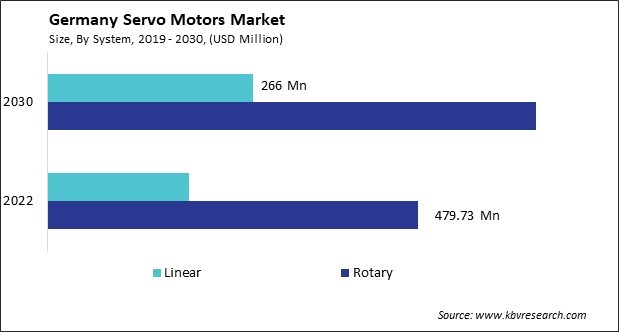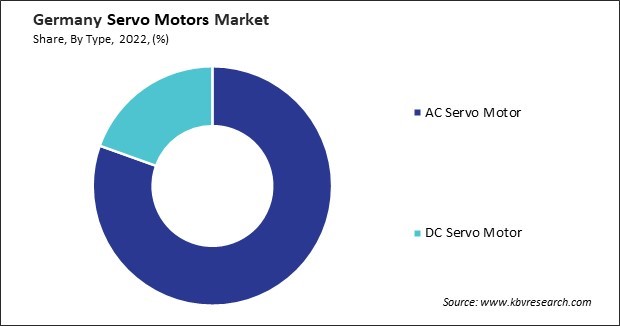The Germany Servo Motors Market size is expected to reach $898.06 Million by 2030, rising at a market growth of 3.8% CAGR during the forecast period.
The servo motors market in Germany has witnessed substantial growth over the past few years, driven by advancements in automation technologies across various industries such as automotive, manufacturing, robotics, and aerospace. As Germany continues to be a powerhouse in industrial production, the demand for servo motors remains robust, fueled by the need for enhanced productivity, accuracy, and energy efficiency in manufacturing processes. One of the key factors driving the growth of the servo motors market in Germany is the increasing adoption of automation solutions across industries.

Moreover, the automotive industry, a significant contributor to Germany's economy, is a major consumer of servo motors. With the rise of electric vehicles (EVs) and the need for more sophisticated manufacturing processes, the demand for servo motors in this sector is expected to escalate further. According to the German Trade & Invest, the German government has set itself the goal of 15 million fully electric vehicles by the year 2030 and has a role as the lead provider and industry for e-mobility solutions. The 328,000 fully electric vehicles manufactured had an industry value of around EUR 13.7 billion – up from EUR 8 billion in 2020. Servo motors are utilized in various applications within the automotive manufacturing process, including assembly lines, robotic arms, and precision machining, driving the industry growth in Germany.
However, the COVID-19 pandemic has significantly impacted the servo motors market in Germany, causing disruptions in supply chains, production schedules, and overall economic activity. During the initial stages of the pandemic, many manufacturing facilities were temporarily shut down or operated at reduced capacities to comply with lockdown measures and ensure employee safety. This led to a slowdown in demand for servo motors as companies postponed investments in automation and capital equipment. However, as the economy gradually recovers and industries adapt to the new normal, the demand for servo motors is expected to rebound.
In Germany, the servo motors market is experiencing a significant shift driven by the increasing utilization of renewable energy sources. As the country aims to transition towards a more sustainable and environmentally friendly energy landscape, renewable energy sectors such as wind and solar power are witnessing rapid growth. One of the primary drivers behind the rising utilization of renewable energy sources is the German government's ambitious targets for reducing greenhouse gas emissions and fostering renewable energy adoption.
According to the International Trade Administration, the country has set ambitious targets to source 80% of its energy from renewables by 2030. By 2022, Germany had made significant progress, achieving 46% of this goal. Renewable sources constituted a substantial 42.3% share of the domestic energy mix. Through initiatives like the Energiewende, Germany aims to generate a substantial portion of its energy from renewable sources by 2030. This has led to a surge in investments in wind farms, solar parks, and other renewable energy infrastructure projects across the country.
Moreover, servo motor technology advancements have improved efficiency, reliability, and performance, making them increasingly attractive for applications in renewable energy sectors. German manufacturers are developing servo motors with higher torque density, better precision, and enhanced control capabilities to meet the demanding requirements of renewable energy systems. Thus, the surge in renewable energy adoption in Germany is driving a significant shift in the servo motors market, with technological advancements and government initiatives catalyzing growth and innovation.
In Germany, the servo motors market has witnessed a significant shift in recent years with the rising adoption of AC servo motors. One of the key drivers of the AC servo motor market in Germany is the country's strong industrial base, particularly in sectors such as automotive, machinery, and electronics. These industries demand high-performance servo motors to ensure precise and efficient operation of their manufacturing equipment. Additionally, the emphasis on Industry 4.0 initiatives has further propelled the demand for advanced automation technologies, including AC servo motors, to enhance productivity and flexibility in production processes.
The automotive industry is a significant consumer of AC servo motors. These motors are used in various applications within automotive manufacturing plants, such as robotic assembly lines, CNC machining, and material handling systems. According to the Germany Trade & Invest, German automobile manufacturers produced over 15.6 million vehicles in 2021. As automotive manufacturers strive for greater efficiency and flexibility in production, the demand for high-performance servo motors continues to grow.
Furthermore, focusing on energy efficiency and sustainability influences the choice of servo motors in Germany. AC servo motors offer higher efficiency than traditional motors, reducing energy consumption and operating costs for industrial applications. As German companies prioritize environmental sustainability, the demand for energy-efficient servo motors is expected to increase. Therefore, Germany's strong industrial base, emphasis on Industry 4.0, and focus on energy efficiency drive the significant shift towards adopting AC servo motors, particularly in sectors like automotive, machinery, and electronics.

The servo motors market in Germany is a vital segment of the country's industrial landscape, renowned for its engineering excellence, precision manufacturing, and innovation. One major player in the German servo motors market is Siemens AG. Siemens is a multinational conglomerate known for its comprehensive industrial automation and control solutions portfolio. The company's servo motors are renowned for their precision, reliability, and performance, making them essential components in various industrial applications. Siemens offers a diverse range of servo motors tailored to meet the specific requirements of different industries, from small-scale automation to heavy-duty manufacturing processes.
SEW-Eurodrive GmbH & Co. KG is also a significant participant in the German servo motors market. It is a global supplier of drive technology and automation solutions, offering a comprehensive range of servo motors, gear motors, and drive systems. The company's servo motors are known for their robust construction, reliability, and versatility, serving diverse automotive, logistics, and food processing industries. SEW-Eurodrive's dedication to research and development enables it to deliver cutting-edge servo motor solutions that optimize performance and efficiency in various applications.
Another prominent player in the German servo motors market is Bosch Rexroth AG. Bosch Rexroth is a leading provider of drive and control technologies, offering a wide range of servo motors, drives, and controllers for industrial automation and motion control applications. The company's servo motors are characterized by their high precision, dynamics, and energy efficiency, making them suitable for demanding applications in manufacturing, robotics, and material handling. Bosch Rexroth's commitment to innovation and sustainability ensures that its servo motor solutions meet the evolving needs of customers while minimizing environmental impact.
In addition to these major players, several other companies contribute to the competitiveness and innovation of the German servo motors market. Kollmorgen GmbH, for instance, specializes in motion control technologies, including servo motors and drives, designed to meet the demanding requirements of industrial automation and robotics. Lenze SE is another notable player, offering a comprehensive portfolio of motion control solutions, including servo motors, controllers, and software, to optimize machine performance and productivity.
Furthermore, companies such as Beckhoff Automation GmbH & Co. KG, Wittenstein SE, and Pilz GmbH & Co. KG are prominent players in the German servo motors market, bringing expertise and innovation to drive the industry forward. These companies leverage technological advancements, such as digitalization, connectivity, and artificial intelligence, to develop servo motor solutions that enhance precision, flexibility, and reliability in industrial automation applications. Hence, the German servo motors market is characterized by intense competition, innovation, and a strong focus on engineering excellence.
By System
By Type
By Application
Our team of dedicated experts can provide you with attractive expansion opportunities for your business.

